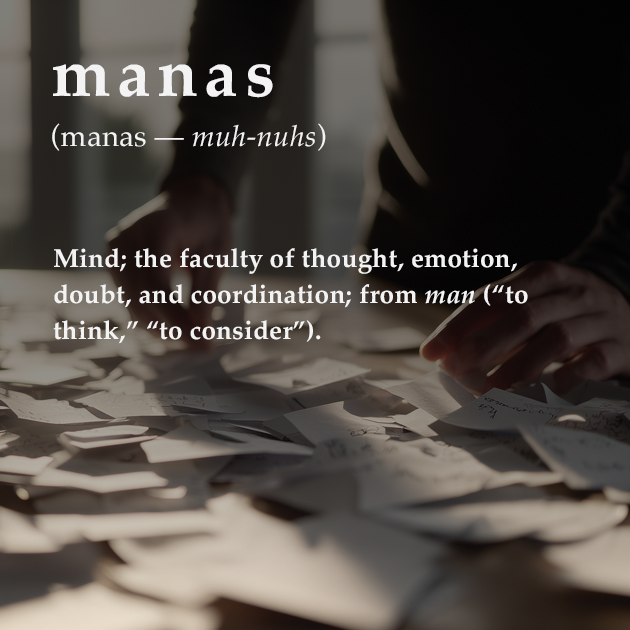Manas - The Doubting Mind
- Daniel McKenzie

- Sep 13, 2025
- 2 min read
Updated: Jan 4

In Vedanta, manas refers to the mind as a doubting, processing instrument. It is part of the fourfold antahkarana (inner instrument) along with buddhi (intellect), chitta (memory), and ahankara (ego). Among these, manas is marked by its oscillating nature: constantly weighing, comparing, and questioning.
The tradition describes manas as operating through sankalpa–vikalpa — the movement between options, “shall I, shall I not?” It receives inputs from the senses and organizes them, but it is not decisive. For example, when one sees something indistinct in dim light, manas wavers: “Is it a rope or a snake?” The decision belongs to buddhi.
This indecisive, restless quality makes manas both necessary and dangerous. It is the field of desire, imagination, and emotion, which can lead one astray if uncontrolled. At the same time, manas is indispensable for functioning in the world and for spiritual practice.
Vedanta distinguishes sharply between manas and the Self. The mind is inert (jada), illumined only by consciousness. Awareness is the witness of the mind’s movements, never altered by them. For this reason, disciplines like shama (quietude) and dama (sense control) are prescribed: not to destroy the mind, but to steady it so it becomes a clear instrument for knowledge.
Root & Meaning
From root man (to think, consider).
Manas = mind; the faculty of thought, doubt, coordination.
Scriptural References
Bhagavad Gita 6.5–6: “The mind (manas) can be the friend or enemy of the self.”
Chandogya Upanishad 7.3.2: Mind is greater than speech, as it grasps meaning.
Taittiriya Upanishad 2.7: Mind is part of the manomaya kosha (the mental sheath).
Traditional View
One of the four functions of antahkarana.
Characterized by sankalpa–vikalpa (doubt, vacillation).
Coordinates sensory input before buddhi decides.
Vedantic Analysis
Manas is inert, illumined by consciousness.
Seat of desire, imagination, and emotion.
Can enslave the seeker through distraction, or serve as a tool when disciplined.
Spiritual growth requires mastery of manas through shama and dama.
Common Misunderstandings
That manas = the whole mind: It is only one aspect; intellect, ego, and memory are distinct.
That manas is conscious: It is not self-aware; awareness illumines it.
That quieting manas alone brings liberation: Control is necessary but only preparatory; self-knowledge liberates.
Vedantic Resolution
Manas is the doubting, processing function of the inner organ. It is never the Self, but an instrument of experience. With discipline, it becomes steady enough for self-inquiry; without it, it drags the seeker into distraction.
